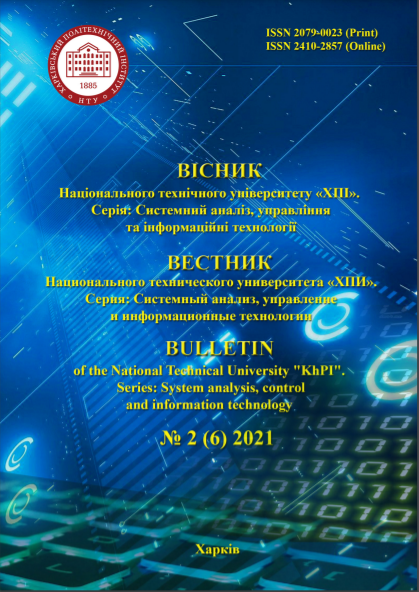ALGORITHMIC SUPPORT OF THE WEB SERVICE RECOMMENDATION SYSTEM FOR LEARNING FOREIGN LANGUAGES
DOI:
https://doi.org/10.20998/2079-0023.2021.02.16Keywords:
algorithm, recommender system, hybrid filtering, DB, web service, Python, content-based filtering, collaborative filteringAbstract
This work is devoted to the analysis of algorithmic support of multimedia content recommender systems and the development of a web service to
increase the efficiency of learning foreign languages using a recommender system that personalized the selection of educational content for the user.
To form a list of necessary multimedia content, the main criteria of the recommender system were selected, the basic needs of users were identified,
which the system should solve, since increasing the efficiency of learning a foreign language is achieved not only by choosing teaching methods, but
also by watching multimedia content, namely news, films, educational videos, clips, etc. Therefore, in order to form a list of the necessary multimedia
content, the main criteria of the recommender system were formed, the main needs of users were identified, which the system must solve. From the
side of the method for implementing algorithmic support, various types of data filtering were considered, from modern technical methods to libraries
to ensure the functionality of the system, and the algorithm based on hybrid filtering was chosen, in which known user ratings are used to predict the
preferences of another user. Functional requirements have been developed and a web service has been proposed that allows a comprehensive impact on
user learning when learning a foreign language, software implementation of which is made using Java Script, Python and additional libraries. This
implementation allows you to build a process for tracking changes in user requirements and transfer information to the database (DB) and, after
analyzing the input data, change the proposed multimedia content to the user. In the course of further research, it is planned to conduct practical
experiments, taking into account the specifics of certain methods of teaching foreign languages and the use of statistical data to assess the effectiveness
of the algorithm of the proposed recommender system.
References
Falk K. Recommender systems in practice. Manning Publications, 2017. 49 p. URI: https://dmkpress.com/files/PDF/978-5-97060-774- 9-1.pdf (accessed 13.01.2020).
UNESCO statistics. Available at: https://www.ukrinform.ua/rubricworld/3194622-u-sviti-vidznacaut-den-ridnoi-movi.html (accessed 30.03.2018).
Uzunboylu H. The Effectiveness of Web Assisted English Language Instruction on the Achievement and Attitude of Students. ERIC Abstract, 2005.
Tanyeli N. The Efficiency of Online English Language Instruction on Students' Reading Skills. International Technology, Education and Development Conference (INTED), Valencia, Spain, Mar 3-5, 2008. Available at: https: //files.eric.ed.gov/fulltext/ED504676.pdf (accessed 06.05.2021).
Adomavicius G., Tuzhilin A. Toward the next generation of recommender systems: A survey of the state-of-the-art and possible extensions. IEEE transactions on knowledge and data engineering, 2005, 17 (6), pp.734–749.
Candillier L., Jack K., Fessant, F., Meyer F. State-of-the-art recommender systems. Collaborative and Social Information Retrieval and Access Techniques for Improved User Modeling, 2009.
Pazzani M. J., Billsus D. Content-based recommendation systems. The adaptive web. Springer, Berlin, Heidelberg, 2007, pp. 325-341.
Ricci F., Rokach L., Shapira B. Introduction to recommender systems handbook. Recommender systems handbook. Springer US, 2011, pp. 1–35.
YouTube documentation. Available at: https://neurohive.io/ ru/novosti/iz-chego-sostoit-rekomendatelnaya-sistema-youtube (accessed 24.04.2019).
Netflix documentation. Available at: https://uxplanet.org/netflixbinging-on-the-algorithm-a3a74a6c1f59 (accessed 30.04.2020).
Megogo documentation. Available at: https://www.contentarmor.net/megogo-selects-contentarmor-toprotect-its-pvod-service/ (accessed 12.04.2021).
Ivi documentation. Available at: https://discourse.world/h/ 2019/12/10/As-we-recommend-the-latest-catalogs-in-the-ivi-onlinecinema(Python-code) (accessed 10.12.2019).
Thai-Nghe N., Drumond L., Krohn-Grimberghe A., SchmidtThieme L. Recommender system for predicting student performance. Procedia Computer Science. 2010, 1 (2), pp.2811– 2819.
Moonen M., De Moor B. SVD and Signal Processing, III: Algorithms, Architectures and Applications. Elsevier Science, 2011. 504 p.
Bass L., Clements P., Kazman R. Software Architecture in Practice. 2-nd edition, Addison-Wesley, 2003.
Jones E., Oliphant Tr., Peterson P. et al. SciPy: Open source scientific tools for Python, 2001. Available at: http://www.scipy.org/ (accessed 06.12.2015).
Zheng Y., Mobasher B. CARSKit: A Java-Based Context-aware Recommendation Engine. Proceedings of the 15th IEEE International Conference on Data Mining. NJ, USA, 2015.
NodeJS. Available at: https://metanit.com/web/nodejs/1.1.php (accessed 02/10/2019).
Fastify framework. Available at: https://www.fastify.io (accessed 06.11.2020).
MongoDB documentation. Available at: https://docs.mongodb.com/ manual (accessed 26.08.2021).
Mongoose Docs. Available at: https://docs.npmjs.com/ (accessed 09.09.2021) (accessed 06.12.2019).
Redis documentation. Available at: https://redis.io/documentation (accessed 17.11.2020).
Downloads
Published
How to Cite
Issue
Section
License
LicenseAuthors who publish with this journal agree to the following terms:
- Authors retain copyright and grant the journal right of first publication with the work simultaneously licensed under a Creative Commons Attribution License that allows others to share the work with an acknowledgement of the work's authorship and initial publication in this journal.
- Authors are able to enter into separate, additional contractual arrangements for the non-exclusive distribution of the journal's published version of the work (e.g., post it to an institutional repository or publish it in a book), with an acknowledgement of its initial publication in this journal.
- Authors are permitted and encouraged to post their work online (e.g., in institutional repositories or on their website) prior to and during the submission process, as it can lead to productive exchanges, as well as earlier and greater citation of published work (See The Effect of Open Access).


